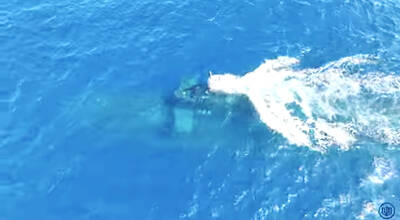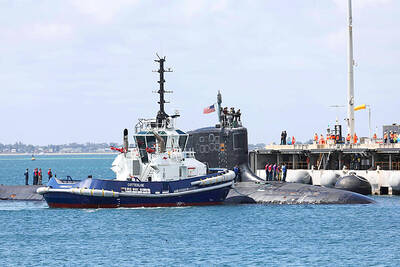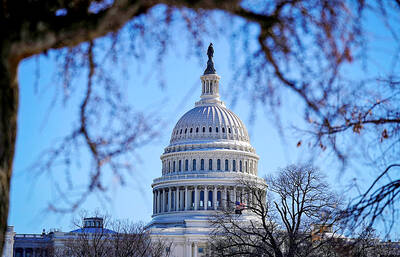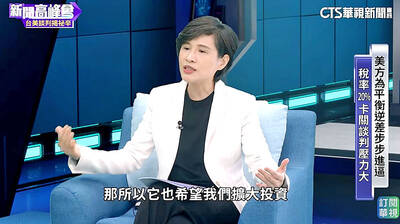US President Barack Obama has seized on an extraordinary overture from Cuba to propose talks aimed at breaking the half-century hostility born between Washington and Havana during the Cold War.
He told a Summit of the Americas with Latin American leaders in Trinidad and Tobago that he wanted to establish “a new beginning” with Cuba that would recognize past US “errors,” but require reciprocal gestures from the communist island.
The conciliatory language raised the prospect of the US ending its 47-year-old embargo on Cuba.
Several other leaders at the summit — including those from Argentina, Nicaragua and Belize — voiced a general consensus in Latin America that the embargo should be scrapped and Cuba readmitted into regional bodies.
The summit was to get into full swing yesterday. The three-day gathering of 34 countries in the Americas — all, in fact, except Cuba — was meant to address common energy, environmental and public security challenges in a succession of plenary sessions.
But an unexpected gesture of conciliation by Obama towards Cuba on the first day overshadowed those issues.
“I am prepared to have my administration engage with the Cuban government on a wide range of issues — from drugs to migration and economic issues to human rights, free speech and democratic reform,” Obama said.
The proposal came after a surprise overture from Cuban President Raul Castro, who on Thursday said he now stood ready to discuss “everything” with Washington — including specifically the hot-button issues of human rights, press freedom and political prisoners.
Several Latin American nations and delegates at the summit voiced a general agreement that the US embargo should go and Cuba be readmitted into regional bodies such as the Organization of American States, from which it was expelled under US pressure in 1962.
Venezuelan President Hugo Chavez, Cuba’s closest and most voluble ally, offered an opportunity for another gesture of conciliation at the summit, briefly shaking hands with Obama late on Friday.
One official said Chavez told Obama in Spanish: “I shook hands with [former US president George W.] Bush with this hand eight years ago. I want to be your friend.”
Also See: Clinton impresses by admitting US policy has failed

CSBC Corp, Taiwan (台灣國際造船) yesterday released the first video documenting the submerged sea trials of Taiwan’s indigenous defense submarine prototype, the Hai Kun (海鯤), or Narwhal, showing underwater navigation and the launch of countermeasures. The footage shows the vessel’s first dive, steering and control system tests, and the raising and lowering of the periscope and antenna masts. It offered a rare look at the progress in the submarine’s sea acceptance tests. The Hai Kun carried out its first shallow-water diving trial late last month and has since completed four submerged tests, CSBC said. The newly released video compiles images recorded from Jan. 29 to

DETERRENCE EFFORTS: Washington and partners hope demonstrations of force would convince Beijing that military action against Taiwan would carry high costs The US is considering using HMAS Stirling in Western Australia as a forward base to strengthen its naval posture in a potential conflict with China, particularly over Taiwan, the Wall Street Journal reported on Saturday. As part of its Indo-Pacific strategy, Washington plans to deploy up to four nuclear-powered submarines at Stirling starting in 2027, providing a base near potential hot spots such as Taiwan and the South China Sea. The move also aims to enhance military integration with Pacific allies under the Australia-UK-US trilateral security partnership, the report said. Currently, US submarines operate from Guam, but the island could

RESTRAINTS: Should China’s actions pose any threat to Taiwan’s security, economic or social systems, China would be excluded from major financial institutions, the bill says The US House of Representatives on Monday passed the PROTECT Taiwan Act, which states that Washington would exclude China from participating in major global financial organizations if its actions directly threaten Taiwan’s security. The bill, proposed by Republican Representative Frank Lucas, passed with 395 votes in favor and two against. It stipulates that if China’s actions pose any threat to Taiwan’s security, economic or social systems, the US would, “to the maximum extent practicable,” exclude Beijing from international financial institutions, including the G20, the Bank for International Settlements and the Financial Stability Board. The bill makes it clear that China must be prepared

Taiwanese trade negotiators told Washington that Taipei would not relocate 40 percent of its semiconductor production to the US, and that its most advanced technologies would remain in the nation, Vice Premier Cheng Li-chiun (鄭麗君) said on Sunday. “I told the US side very clearly — that’s impossible,” Cheng, who led the negotiation team, said in an interview that aired on Sunday night on Chinese Television System. Cheng was referring to remarks last month by US Secretary of Commerce Howard Lutnick, in which he said his goal was to bring 40 percent of Taiwan’s chip supply chain to the US Taiwan’s almost